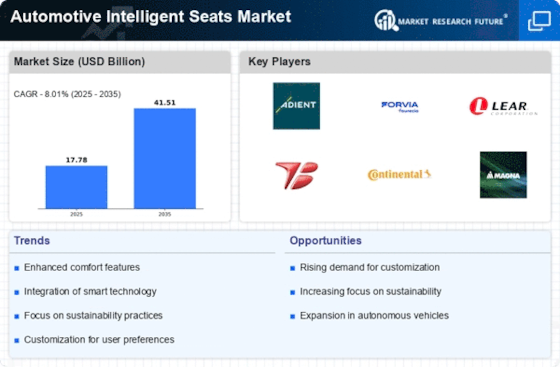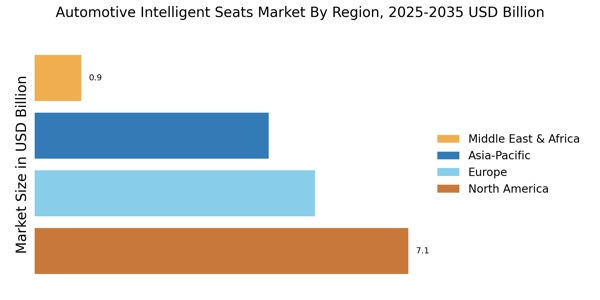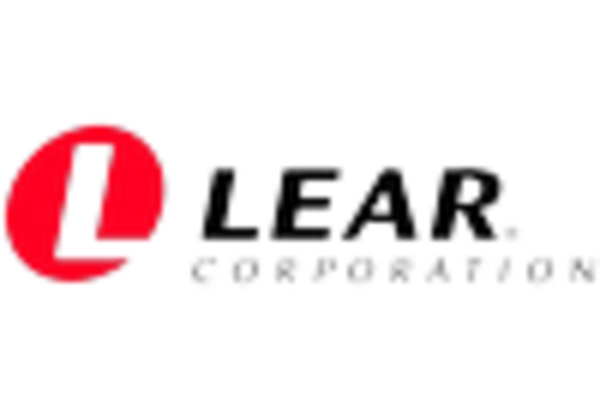Increased Focus on Vehicle Safety
The Automotive Intelligent Seats Market is witnessing a heightened focus on vehicle safety, which is influencing seat design and functionality. With the rise in awareness regarding road safety, manufacturers are integrating advanced safety features into automotive seats. This includes side airbags, anti-whiplash systems, and crash sensors that enhance passenger protection during collisions. Recent statistics suggest that vehicles equipped with intelligent seating systems can reduce injury risk by up to 30%. As safety regulations become more stringent, the demand for innovative seating solutions that prioritize passenger safety is expected to rise. Consequently, this trend is likely to propel the Automotive Intelligent Seats Market forward, as manufacturers adapt to meet regulatory requirements and consumer expectations.
Rising Demand for Comfort and Ergonomics
The Automotive Intelligent Seats Market is experiencing a notable increase in demand for comfort and ergonomic designs. As consumers become more discerning about their driving experience, manufacturers are focusing on developing seats that provide enhanced comfort and support. This trend is reflected in the growing integration of adjustable lumbar support, memory foam, and climate control features in automotive seating. According to recent data, the market for ergonomic automotive seats is projected to grow at a compound annual growth rate of approximately 7% over the next five years. This shift towards comfort-oriented designs is likely to drive innovation within the Automotive Intelligent Seats Market, as companies strive to meet consumer expectations for a more enjoyable driving experience.
Growing Interest in Sustainable Materials
Sustainability is becoming a pivotal concern within the Automotive Intelligent Seats Market. As consumers increasingly prioritize eco-friendly products, manufacturers are exploring the use of sustainable materials in seat production. This includes recycled fabrics, bio-based foams, and other environmentally friendly components. Market analysis indicates that the segment of sustainable automotive materials is projected to grow by approximately 10% over the next few years. This shift towards sustainability not only aligns with consumer preferences but also helps manufacturers comply with environmental regulations. As a result, the Automotive Intelligent Seats Market is likely to see a surge in the adoption of sustainable practices, reflecting a broader commitment to environmental responsibility.
Technological Advancements in Seat Features
Technological advancements are significantly shaping the Automotive Intelligent Seats Market. Innovations such as integrated heating and cooling systems, massage functions, and advanced safety features are becoming increasingly prevalent. These technologies not only enhance passenger comfort but also contribute to overall vehicle safety. For instance, the incorporation of sensors that monitor driver posture and alertness is gaining traction. Market data indicates that the segment of intelligent seating solutions is expected to witness a growth rate of around 8% annually, driven by these technological enhancements. As manufacturers continue to invest in research and development, the Automotive Intelligent Seats Market is poised for substantial growth, reflecting the evolving needs of consumers.
Customization Trends in Automotive Interiors
Customization is emerging as a key driver in the Automotive Intelligent Seats Market. Consumers are increasingly seeking personalized options that cater to their individual preferences and lifestyles. This trend is evident in the growing demand for customizable seat designs, materials, and features. Manufacturers are responding by offering a range of options, from adjustable seating configurations to personalized upholstery choices. Market data suggests that the customization segment is expected to grow at a rate of around 6% annually, as consumers prioritize unique and tailored experiences in their vehicles. This focus on customization is likely to enhance the appeal of the Automotive Intelligent Seats Market, as it aligns with the broader trend of personalization in consumer products.

















